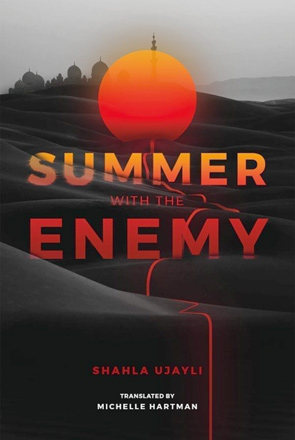Summer with the Enemy
Shahla Ujayli
Translated by Michelle Hartman
Massachusetts: Interlink Books, 2021
Pp. 288
In “Summer with the Enemy”, the characters are paramount. None of them are typical, much less fit into any stereotype; each opens up a different world of perception. The author, Shahla Ujayli, dedicates her book to “the Raqqa of my memory”, and her characters’ personalities, each one uniquely moulded, are her main vehicle for recreating the city as it was in the 1980s — seemingly isolated but actually with many ties to the outside world.
As the novel begins, Lamees, who narrates the story, is in Cologne, where she has taken refuge from the Syrian war. Here, she reunites with Abboud, her best friend from childhood. Once again, she is on the banks of a famous river spanned by bridges, the Rhine, recalling her life in Raqqa on the Euphrates. “I’ve always loved bridges,” Lamees says, “they make return a possibility no matter how much time has passed!” (p. 8)
Return is both psychological and potentially physical, for she immediately plunges into childhood memories of events she shared with Abboud decades ago. Yet, return also has a future aspect, for one senses that as much as Lamees is glad to be in Germany and plans to make the most of her time there, she has not cut her emotional ties to Syria, despite or maybe because of losing her family there.
Abboud’s mother is Czech, his father one of many Raqqa men who studied in Eastern Europe in the 1970s and brought their foreign wives back to their country. Lamees’s family is also mixed by virtue of her grandmother of Armenian heritage, who grew up in Bethlehem, and had been a dancer in Beirut, Cairo and Alexandria in her youth — a past over which a thick veil of silence is enforced as soon as she sets foot in Raqqa, in order to avoid the disapproval of conservative townspeople. Still, these whiffs of a life beyond the known borders subtly penetrate people’s consciousness: “Those families gave our little town of Raqqa wings!” (p. 15)
Lamees recounts many escapades with Abboud. She spent more time in the streets than most girls since her mother had more or less abdicated her parenting role due to anger at her husband’s betrayal. After his mother returns to her country, Abboud ran wild with Lamees; for many years, she believed, wrongly, that one of their childish pranks had killed her grandmother. But her most fraught relationship was with her mother at whose side she stayed throughout the war, giving up her chance to complete her graduate work, which she hopes to resume in Germany.
One might assume that the book title refers to the time when Daesh took over Raqqa and imposed its extremist agenda, but relatively few passages are devoted to this difficult period. It is as if Ujayli wants to show that Raqqa and the Syria people are much stronger than Daesh. In her stream-of-consciousness narrative, it is also as though she wants to say that the personal sphere has more impact on the individual’s development than the political context.
Instead of focusing on the war or politics, she tells a story of great loves, heartbreaks, betrayals, disputes and reconciliations among family and friends. The point at which the personal and the political merge, however, is her portrayal of refugees: “Travel is neither a privilege nor a pleasure in the world of refugees and asylum seekers, but rather a stigma and dishonour. Germany is full of Syrians who arrived in a variety of ways — from First Class tickets to deadly sea-borne rafts, to crawling through forests and the bush”. (p. 37-38)
The narrative meanders back and forth through history, sometimes laced with myth, from ancient Arab science to Ottoman times and modern Syria, to beautiful descriptions of Cologne, the Euphrates and the harsh realities of living under dictatorship. Family secrets are revealed as is the impact of women’s potential being curtailed by outmoded prohibitions. “The ancient walls surrounding the old city of Raqqa contain endless stories” and Lamees relates them in a fascinating way. (p. 152)
Gradually, the full dimensions of Lamees’s relationship with her beautiful, but usually depressed, mother unfold. After her father leaves Syria to be with his lover, her mother stagnates, until the arrival of a young German scholar who is doing research on the 9th century Arab astronomer, Al Battani, who had lived in Raqqa. Her mother brightens up at this unexpected companionship, but Lamees suspects that the time they spend together is more than research, and she fears being abandoned.
Throughout the narrative, Ujayli employs compelling, original imagery to convey the young girl’s conflicted feelings. “It was as if the world turned us into a chapter in a book…” (p. 90) In the face of grown-ups’ actions, which she barely understands, she feels like “a speck of dust in a battle no one paid attention to… He wants to steal our sky, our stars, our Al Battani… he also wants to steal my mother”. (p. 117-118)
Now, in Germany, this same man is key to Lamees continuing her graduate degree. How will she react? Has she attained the freedom and confidence she has been seeking? At the end, the author leaves the reader hanging; many questions remain unanswered but one has learned a lot about the unexpected twists and turns human interaction can take.
